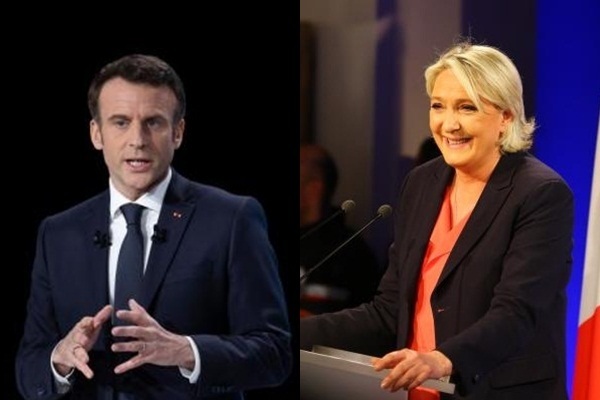London, (Samajweekly) Notwithstanding a slightly low voter turnout, an opening estimate of the result of the first round of the French presidential election by pollsters Ipsos, gave the incumbent President Emmanuel Macron 28.1 per cent of votes, with Marie Le Pen of the far-right National Rally, better known as National Front, securing 23.3 per cent support.
The two now go through to a decisive second round of voting on April 24 for a re-match. Supporters of the finalists were planning parties in celebration of qualifying into the ultimate stage, which were predicted to continue late into the night.
Among the 12 candidates altogether, leftist JeanLuc Melenchon registered an impressive 20.1 per cent – which is likely to mostly transfer in favour of Macron in the second round. Eric Zemmour, an extreme rightist, posted 7.2 per cent – much of this will probably go to Le Pen in the second round. Valerie Pecresse of the traditional right-of-centre Republicans got only 7.2 per cent – she requested her voters to back Macron in the second round. Socialist Anne Hidalgo fared even worse with 2.1 per cent.
Macron cast his vote in Le Touquet, a seaside town in Pas-de-Calais in northern France and urged voters to exercise their franchise. But he failed to sufficiently enthuse them.
Turnout was down as compared to polling in the first round in 2017, but still around 75 per cent. French voters have not stayed away from casting their ballot in this manner, other than their apathy of 2002.
The low turnout is interpreted by commentators as a reflection of defiance and dissatisfaction among French people in the politics of the country, looked upon as a worrying trend.
Le Monde, the leading French daily, commented in an editorial piece: “Started in times of pandemic (Covid-19) and completed in times of war (in Ukraine), this presidential campaign suspended between two perils leads to a first round threatened by a double danger” – abstention and the rise in support for the far-right.
Reporting on Paris, the paper wrote: “Many voters hesitated a lot before deciding, sometimes even in front of the voting booth.”
In what was described as “the chic districts of Marseille” – a port city, founded in 600 BC and France’s oldest urban centre in the south-west of the country – some leaders of the Republicans reportedly led the way to vote for Macron of En Marche, a centrist formation established in 2016. “A conversion with a bitter taste for some voters,” Le Monde’s correspondent said.
In sandy Reunion Island, a French prefecture in the Indian Ocean, where 25 per cent of its 900,000 odd population are of Indian origin, the percentage of polling was also down from five years ago. Standing in bright sunshine, one local resident was quoted as saying: “Life is more pleasant here (on the beach) than in a voting booth!” Behind her the waters were an exotic turquoise blue.
In 2017, Macron won 24 per cent of the votes to Le Pen’s 21.3 per cent in the first round. But he went on to capture 66.1 per cent in the second ballot to Le Pen’s 33.9 per cent to be victorious quite comfortably. He is expecting this will be repeated two weeks from now to clinch for him a re-election.










